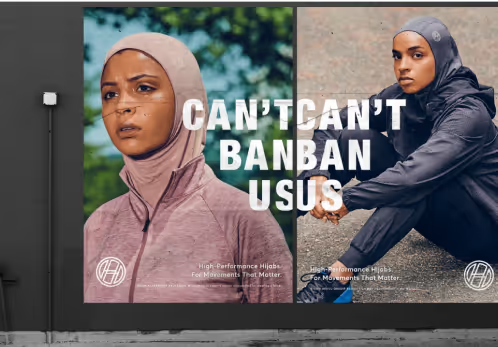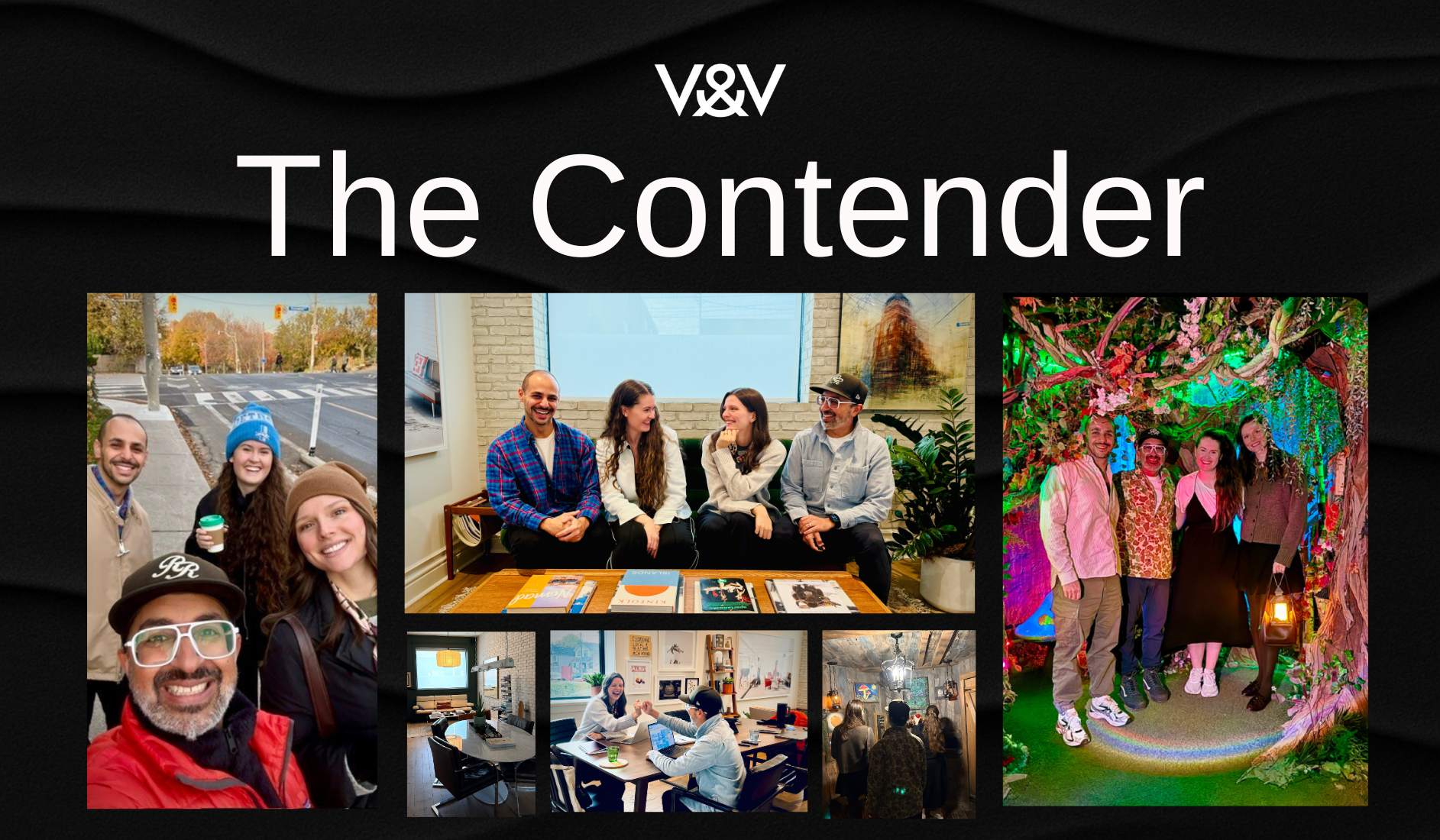We Help Challenger Brands Rewrite the rules and win!































For leaders with vision. And something to prove.
Our work drives economic, human, and environmental progress – aligning purpose with performance, and performance with purpose.
Every engagement is designed to shape a brand that feels unmistakably itself: clear in what it stands for, consistent in how it shows up, and built to land with the people who matter.
.avif)
What was most rare about 5&V is how quickly they understood the issues we were trying to solve. From our first conversation we started moving toward creative and bang-on appropriate solutions, and that kept going right through the end of the project. They were also super-responsive to any issues we had, which is the most important trait in a partner.

5&Vine was a crucial partner in developing a new name and brand for Rethink Climate. Name changes are always difficult – but 5&Vine never wavered in their commitment to develop a name and brand that would reflect our mission. We are delighted with the reaction we have received in the market, reflecting the high quality of their work. And they are just great people.

5&Vine understands challenger brands and helped us with a super meaningful rebrand that embodies our reason for being.

The team at 5&Vine has been amazing to work with. They are very knowledgeable and I truly believe they have the expertise to bring any business to the next level. They are great partners as they always try their best to stay flexible to our needs whenever we needed to pivot to a different direction. I would recommend them to any company who needs expert guidance and a team who would roll up their sleeves to get things done.

5&Vine was instrumental in transforming our brand with a strong sense of purpose. With a new name and brand, we are now standing out from established players, gaining recognition among our target audience, and accelerating customer growth. The impact has been incredible!

5&Vine led our brand repositioning and accelerated our growth. Their dedication, insights, and creative approach are evident in their process and impact. I would highly recommend them to any startup looking to take their brand to the next level.

5&Vine scaled our high-growth startup. They helped drive alternative pricing models, improved user engagement, evolved our creative, and drove revenue. They are great partners that adapted and grew alongside our business.

As a fellow certified B Corp, we were thrilled to work with the 5&Vine team that believes, as we do, business can be a force for good. 5&Vine helped us realign critical marketing efforts to reach new consumers seeking out sustainable, value-driven, and fashion-forward activewear.

5&Vine possesses an exceptional ability to listen and collaborate, differentiating them from most agencies. They crafted a powerful brand positioning by flexing on the strength of our origin story, showcasing our commitment to sustainability and inclusivity, and deepening our connection to the consumer. I highly recommend.

5&Vine are our trusted advisors and helped us build our Growth Marketing function. They provided actionable advice, tailored for our exact stage of growth. Even today, all of our marketing efforts rely on the strong foundation that we built jointly with their talented team.

5&Vine’s results can be expressed by a single word: stellar. Within weeks of launching our new brand, we have already started to see tangible business benefits. Thank you, 5&Vine, for the awesome work!”

5&Vine’s assistance was crucial in transitioning our focus to Borrowell’s Free Credit Score. They helped us mature our marketing function, and worked closely with our team to refine the metrics we track as well as our tactics and strategy.

5&Vine was critical to helping our company during a leadership transition. They engaged with our leadership and marketing teams to reset our strategy, putting us on a new course that continues to be successful. Would highly recommend!

As a fast-growing startup with a limited budget, we had to make every dollar count. We wanted an experienced CMO, specialists below them, and a marketing budget, but we couldn’t do it all – until we met the team at 5&Vine. 5&Vine jumped in at a critical time, quickly analyzed our issues and opportunities, and delivered.

5&Vine was my first hire when I took the helm of Mama Earth Organics, knowing they could help transform the business. They quickly began driving the performance we needed and developed a framework to build an enduring brand. 5&Vine are amazing business thought-partners, with a Swiss Army knife skill set that any-sized business will benefit from.

5&Vine was instrumental in helping to design and rapidly execute a robust marketing strategy that we’ve used to become the global leader in medical imaging. Results from their work were game-changing.

Acquiring customers is hard and any founder that thinks ‘it’ll happen on its own’ is fooling themselves. 5&Vine is the multiplier you need for your startup. They are game changers and our trusted partners.

5&Vine are strategy mavericks. They get to the core of your business and identify how to leverage marketing to drive growth. I would recommend their approach in a heartbeat.

5&Vine bridged a gap at a critical time. They were recommended to me by an investor, quickly built trust, and put our marketing team back on the rails. If I could change one thing, it’s that I should’ve hired 5&Vine sooner.

5&Vine was amazing to work with. We were looking for leadership and guidance on re-branding our company and that’s exactly what we got. Rahul is a true artist: from value proposition, to name, through to logo and design, we now feel like we have the foundation to build a transformational company in the employee well-being space. Thanks 5&Vine!

5&Vine is a partner that brings intellectual honesty, collaboration and a wealth of experience. It’s a partnership in an outcome-oriented mission. It’s an ally in the trenches when you’re getting your ass kicked. It’s a high five from a team you highly respect when you get something right.

The 5&Vine team have been an incredible resource for our brand. Love the quality of their ideas and our shared passion for creating a more just and sustainable world.

5&Vine launched our disruptive UK baby care brand into the US. The team was awesome to work with and packed a real punch in terms of quality of strategic thinking, creative approach and excellence in execution. There was instant rapport, partnership and trust. Their consumer insight helped us get a real understanding for the US market. Our US website has won awards and our paid channels have exceeded performance benchmarks. I would thoroughly recommend the 5&Vine team!

The team at 5&Vine are incredible partners. Their technical and design expertise, combined with their appetite for understanding the nuances of our business and industry, really set us up for success. We’re already seeing improved performance and our website better represents our brand. Big win, and a big thanks to 5&Vine.

5&Vine looked at our strategy through a new lens. They helped us expand into new revenue streams, new customer segments, and build in processes that were critical to scale.

5&Vine are amazing marketing strategists. They led marketing for Greenlight during our early days, and it was one of the best decisions we made.
Brand Foundations
Brand Expression
Digital & Performance
The best ideas aren’t loud – they’re clear.












%20(1).png)


